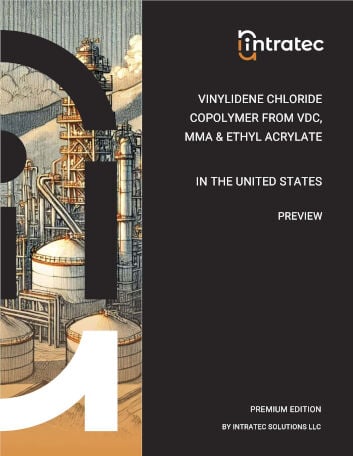Commodity Production Costs Report
Vinylidene Chloride-Vinyl Chloride Copolymer Production
Polyvinylidene Chloride Plant Capital & Operating Cost Analysis | United States | Q4 2025
This report presents the economics of Vinylidene Chloride Copolymer production from vinylidene chloride and vinyl chloride. The process examined is a typical suspension polymerization process. In this plant, vinylidene chloride and vinyl chloride are reacted to produce PVDC.
The report provides a comprehensive study of Polyvinylidene Chloride production and related Polyvinylidene Chloride production cost, covering three key aspects: a complete description of the Polyvinylidene Chloride production process examined; an in-depth analysis of the related Polyvinylidene Chloride plant capital cost (Capex); and an evaluation of the respective Polyvinylidene Chloride plant operating costs (Opex).
The Polyvinylidene Chloride production process description includes a block flow diagram (BFD), an overview of the industrial site installations, detailing both the process unit and the necessary infrastructure, process consumption figures and comprehensive process flow diagrams (PFD). The Polyvinylidene Chloride plant capital cost analysis breaks down the Capex by plant cost (i.e., ISBL, OSBL and Contingency); owner's cost; working capital; and costs incurred during industrial plant commissioning and start-up. The Polyvinylidene Chloride plant operating costs analysis covers operating expenses, including variable costs like raw materials and utilities, and fixed costs such as maintenance, labor, and depreciation.

The process under analysis comprises three major sections: (1) Polymerization; (2) Monomers Recovery; and (3) Drying & Finishing.
Polymerization. Polymerization initiator, dispersing agent and additives required are dissolved in agitated vessels with demineralized water forming solutions which will be fed to the polymerization reactors. The vinylidene chloride monomer, vinyl chloride comonomer and the chemicals solutions prepared are fed to the polymerization reactors, along with hot demineralized water, which heats the reaction media to the polymerization reaction temperature. The polymerization is performed in batch mode at 60 °C under continuous agitation for between 8 and 24 hours until conversion of monomers reach about 90%. After polymerization, the slurry is transferred to the Monomers Recovery section, downstream.
Monomers Recovery. The polymer suspension from Polymerization is transferred to a stripper vessel where residual monomers are steam-stripped from the slurry at reduced pressure. Vinylidene chloride monomer and vinyl chloride comonomer are recovered and recycled to the polymerization. The polymer slurry is transferred to the Drying section downstream.
Drying & Finishing. The free-monomer polymer slurry is fed to an intermediate vessel for the homogenization of several batches. The polymer slurry is then passed through a rotary filter, what yields a wet PVDC cake with residual moisture content. The wet cake is fed to a rotary dryer, and subsequently over-dried in a fluidized-bed dryer. The dried polymer is finally packed in bags before being stored in warehouses located outside battery limits (OSBL).
Report in PDF Format
Download & Explore Anytime
Access in Various Devices
Print & Read Comfortably
Share With Co-workers
Up-to-date Report
Professional report based on Q4 2025 economic data, ensuring timely evaluations.
Multiple Use Cases
Ideal for investment screening, feasibility studies, cost estimates, and research planning.
Proven Methodology
Developed using a consistent methodology honed over a decade, ensuring reliable cost analyses.
Report Editions
Content Highlights
Plant Capital Cost Summary
Summary outlining the capital cost required for building the Polyvinylidene Chloride production plant examined.
Plant Capital Cost Details
Detailing of fixed capital (ISBL, OSBL & Owner’s Cost), working capital and additional capital requirements.
Plant Cost Breakdowns
Breakdown of Polyvinylidene Chloride process unit (ISBL) costs and infrastructure (OSBL) costs; plant cost breakdown per discipline.
Operating Costs Summary
Summary presenting the operating variable costs and the total operating cost of the Polyvinylidene Chloride production plant studied.
Operating Cost Details
Detailing of utilities costs, operating fixed costs and depreciation.
Plant Capacity Assessment
Comparative analysis of capital investment and operating costs for different Polyvinylidene Chloride plant capacities.
Production Process Information
Block Flow Diagram, descriptions of process unit (ISBL) and site infrastructure (OSBL).
Process Consumptions
Raw materials and utilities consumption figures, by-products credits, labor requirements
Process Diagrams
Process flow diagrams (PFD), equipment list and industrial site configuration
Other Polyvinylidene Chloride Production Cost Reports

Vinylidene Chloride Copolymer from VDC, MMA & Ethyl Acrylate
This study presents the economics of Vinylidene Chloride Copolymer production from vinylidene chloride (VDC), ethyl acrylate, and methyl methacrylate (MMA) using an emulsion polymerization process. The economic analysis assumes a plant located in the United States.
Details: 45 kta United States-based plant | Q4 2025 | 107 pages | Issue B | From $799 USD
Bundle & Save
Purchase multiple Polyvinylidene Chloride Production Cost reports and enjoy tiered discounts
up to 10% off!
Could Not Find the Report You Need?
Obtain a Bespoke Report
Get a report targeting the process in which you are interested
See Offer Details
Understand Bespoke Reports and how you can easily order them
Check Editions & Pricing
Complete a brief form and see a quotation for your Bespoke Report
Other Related Production Cost Reports

Vinyl Chloride Production from Acetylene
This feasibility study reviews a typical hydrochlorination process for Vinyl Chloride production from acetylene. In this process, anhydrous hydrogen chloride is reacted in vapor phase with acetylene over a mercuric chloride catalyst producing Vinyl Chloride. The economic analysis presented is based on the construction of an industrial plant in the United States.
Details: 280 kta United States-based plant | Q4 2025 | 107 pages | Issue C | From $799 USD

Vinyl Chloride Production from Ethylene Dichloride
This report presents the economics of Vinyl Chloride production from ethylene dichloride (EDC) in the United States using a typical thermal cracking process. In the process under analysis, EDC is thermally cracked to produce Vinyl Chloride, also generating hydrogen chloride as a by-product.
Details: 500 kta United States-based plant | Q4 2025 | 107 pages | Issue A | From $799 USD
+800 Reports Developed, Targeting +250 Commodities
Vast Report Library
858 independent and up-to-date reports examining embryonic and established production processes.
Free Sample Reports
Quickly understand the structure and depth of content of our professional reports.

